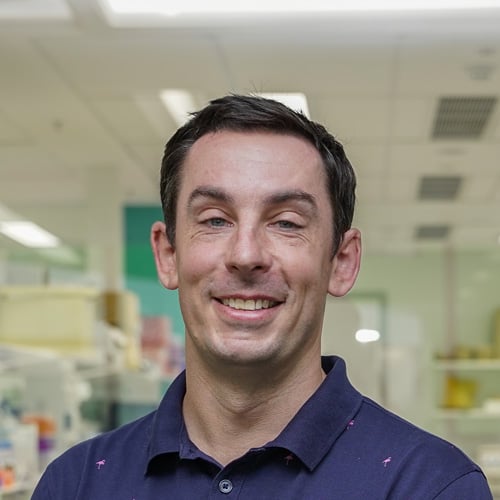
Ben Wylie
Senior Research Fellow
BSc PhD
ben.wylie@thekids.org.au
https://www.linkedin.com/in/wylieben/Dr. Ben Wylie is a passionate immunologist and cancer researcher working as part of the Sarcoma Translational Research group in the The Kids Cancer Centre. Ben has spent over 10 years developing and testing new cancer treatments, with a focus on immunotherapy, and has unique experience across both drug development and academic research.
His research interests include understanding how the immune system can detect and destroy cancer cells and how we can use this knowledge to design better therapies. Ben is currently working to develop safer and more effective treatments for kids with sarcoma.
Find Dr Wylie on ORCID.
Education and Qualifications
- 2018 – Doctor of Philosophy – University of Western Australia
- 2009 – Bachelor with Honours (BSc. Hons) – Murdoch University
- 2008 – Bachelor of Biomedical Science (BSc.) – Murdoch University
Awards/Honours
- 2022 – Cancer Council WA Postdoctoral Fellowship – Perth, Western Australia
Active Collaborations
- Dr. Albert Thomas – Perth Vet Specialists
- Dr. Cameron Evans – University of Western Australia
Projects
Local immunotherapy for sarcoma
We are developing a gel that can be left behind in the wound bed after sarcoma surgery.
Published research
Anti-metabolite chemotherapy increases LAG-3 expressing tumor-infiltrating lymphocytes which can be targeted by combination immune checkpoint blockade
Antibodies that target immune checkpoints such as cytotoxic T lymphocyte antigen 4, programmed cell death protein/ligand 1 are approved for treatment of multiple cancer types.
Local therapy with combination TLR agonists stimulates systemic anti-tumor immunity and sensitizes tumors to immune checkpoint blockade
Protocol for delivery of intraoperative immunotherapy to mice by surgical debulking of subcutaneous tumors
Pre-clinical studies developing novel therapies to prevent cancer recurrence require appropriate surgical models. Here, we present a protocol for surgical debulking of subcutaneous tumors in mice, which allows for intraoperative application of immunotherapy-loaded biomaterials.
A surgically optimized intraoperative poly(I:C)-releasing hydrogel prevents cancer recurrence
Recurrences frequently occur following surgical removal of primary tumors. In many cancers, adjuvant therapies have limited efficacy. Surgery provides access to the tumor microenvironment, creating an opportunity for local therapy, in particular immunotherapy, which can induce local and systemic anti-cancer effects.
Targeting cross-presentation as a route to improve the efficiency of peptide-based cancer vaccines
Cross-presenting dendritic cells (DC) offer an attractive target for vaccination due to their unique ability to process exogenous antigens for presentation on MHC class I molecules. Recent reports have established that these DC express unique surface receptors and play a critical role in the initiation of anti-tumor immunity, opening the way for the development of vaccination strategies specifically targeting these cells.
Temporally restricted activation of IFNβ signaling determines response to immune checkpoint therapy
The biological determinants of the response to immune checkpoint blockade (ICB) in cancer remain incompletely understood. Little is known about dynamic biological events that underpin therapeutic efficacy due to the inability to frequently sample tumours in patients.
IFNβ Is a Potent Adjuvant for Cancer Vaccination Strategies
Cancer vaccination drives the generation of anti-tumor T cell immunity and can be enhanced by the inclusion of effective immune adjuvants such as type I interferons (IFNs). Whilst type I IFNs have been shown to promote cross-priming of T cells, the role of individual subtypes remains unclear. Here we systematically compared the capacity of distinct type I IFN subtypes to enhance T cell responses to a whole-cell vaccination strategy in a pre-clinical murine model.
